![]()
![]()
![]()
![]()
![]()
![]()
![]()
![]()
![]()
![]()
![]()
![]()
![]()
![]()
![]()
![]()
|
|
|
|
|
|
|
|
|
|
|
|
|
|||||||
|
|||||||||
|
|
|
|||||||
January 2000 Film Music CD Reviews |
Film Music Editor: Ian Lace |
|
Return to the January Index with thumbnails Part 1
The Lalo SCHIFRIN feature
ALEPH 003 [42:16]
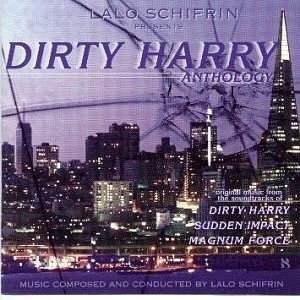
This diamond hard, brilliant, big band jazz-based collection of Dirty Harry scores commences with words that are now almost legendary to film fans: "Ah hah! I know what you’re thinking. Did he fire six shots or only five….do you feel lucky? Well, do you punk?!?"
Schifrin’s abrasive and powerful music with its hectic-paced, hard-driven rhythms is entirely appropriate for the taut urban thrillers of the San Francisco-based Dirty Harry series which began with Dirty Harry in 1971 and ended with The Dead Pool in 1988.
Of the five films in the series, Schifrin scored four. The memorable signature motif for Dirty Harry himself is announced on electric piano in the opening cue ‘Dirty Harry’s Creed.’ Much of this score is very dark, frightening even. Take the cue ‘Floodlights’ for instance, where there are evocative glissandi and clashing dissonances and running pizzicato string figures, and weird effects including subtle distressed female voices. Then there is the theme for the maverick vigilante cops of Magnum Force where, again, Schifrin uses female voices to forge the link between these first two films in the series plus harsh unrelenting snare drum motifs and dark synth material ‘The Cop’. In this score Schifrin weaves car radio voices into his synth tapestry. In ‘Unicorn’s Head’ he adds electronic organ and writes shadowy stealthy, stalking material, and a calliope sound suggests some demented fairground merry-go-round. These three tracks, especially, are the stuff nightmares are made of.
Some relief is found in the more relaxed opening of ‘Road to San Paulo’ which suggests a romantic interlude but as the tempo picks up one wonders how relaxing the journey really is. More settled is ‘San Francisco after Dark.’ After glittering opening bars, the music becomes romantically smoochy, saxophone prominent with piano, drums and sweetening strings.
But it is for the tense suspenseful music, that Schifrin delivers in spades, that this album is famed for – just don’t listen to it late at night if you are by yourself.
Reviewer
Ian Lace

Music from the film conducted by the composer
WARNER BROS 9362-45008-2 [32:17]
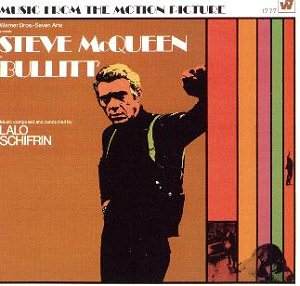
Bullitt (1968) was a tough cops and robbers film set in San Francisco. It would have been routinely tedious had it not been for the charismatic presence of Steve McQueen and probably the wildest, most exciting car chase ever filmed.
Lalo Schiffrin’s score is still remarkably popular and has seen something of a revival of late with copies of this CD prominent in most shops. It is big band mainstream jazz-based with strong Latin inflections. The music of many tracks is thrusting and exciting appropriate to the hard-edged gritty atmosphere of this fast-moving thriller. One track, Ice Pick Mike has dark sinister piano figures, growling brass, a low rumbling saxophone motif over an abrasively scraping ostinatio. I guess by the powerful motor rhythms of ‘Shiting Gears’, that this track serves as undersoring for the famous car chase. More relaxed and romantic, sometimes smoochy material makes up other cues such as ‘The Aftermath of Love’ and ‘On the Way to san Mateo;’ while others such as ‘The First Snowfall’ make agreeable easy listening.
The music divorced from the film makes great listening; it’s great jazz to a great beat’ – good for dancing too.
Reviewer
Ian Lace

OST
ALEPH RECORDS 014 [56:31
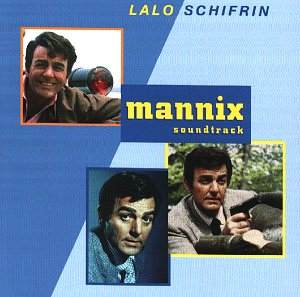
Mannix was a long running TV series (1967-1975) revolving around the life and adventures of a PI named, er, Mannix.
Mannix theme is typical of 60's music and quite similar to many other TV themes of that time like Bewitched, The Jetsons etc.and quite memorable. It has a distinct jazzy flavour and driving beat. Many tracks utilise similar orchestrations, brass, bass, percussion some strings and, occasionally, piano and synths, so that most of the tracks feel and sound the same. Some tracks stand out though, like "SAO PAOLO AFTER DARK", with its delicious Latin flavour; and, especially, "WARNING: LIVE BLUEBERRIES", a very sensitive piece of music, introduced by wind and guitars, with the later addition of orchestra, both demonstrating Schifrin’s lyrical abilities beyond any doubt. These tracks elevate the whole score and are pure delight. Also, an attempt to build a sense of suspense is made in "CURTAINS FOR A MURDER", although it is somehow spoiled by the jazzy mood. The CD also contains a quite awful, longer version of the Mannix theme, and a techno mix of the theme as a bonus track which sounds completely out-of-place.
The whole score is typical of its era, sounding quite cheesy and outdated but it certainly has its moments. Apart from them, the score is a mellow, laid-back rendition of the 60's music which is enjoyable if you appreciate this kind of music. Others may find it boring. It will certainly appeal to the 60's generation, and fans of the TV series.
Reviewer
Kostas Anagnostou

OST
ALEPH RECORDS 005 [47:33]
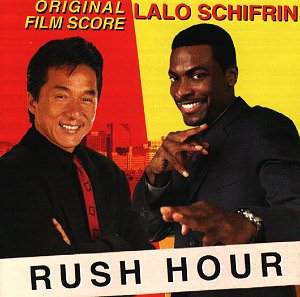
According to director Brett Ratner, Rush Hour is an attempt to revitalise the martial arts movie genre, with a combination of Eastern action and Western comedy, using as a template his favourite Enter the Dragon with Bruce Lee. Since Bruce Lee was unavailable, he opted for Jackie Chan and Chris Tucker to deliver the comic element and composer Lalo Schifrin to compose the score. Schifrin is no stranger to American- produced martial arts spectaculars, having previously scored Enter the Dragon.
Schifrin's score is a colourful blend of Chinese music and funky urban grooves. The CD fires off with a dynamic, hard-edged, reminiscent of Schifrin's 70's style main theme spiced with exotic Chinese instrumentation, guitars, tam-tam crashes, layered-upon-layer driving beat. This enjoyable theme is not visited very often in the subsequent tracks, except in a more elaborated version in the final track, but is used as a template for the action themes used throughout the score.
The composer carefully balances the oriental elements in his music with western motifs, producing an entertaining mixture. The action tracks are thrilling and vibrant, based upon eastern orchestrations, percussions and rattling synths, and dominate the largest part of the score. This doesn't mean that the score lacks a sentimental touch though! This is very subtly introduced by "Soo Yung's Theme", a delicate and sensitive piece of music, flavoured with eastern winds, synthesisers and orchestra that provide the track with a touch of magnificence, especially towards the end. There are even tracks of pure Chinese music (at least the western idea of what Chinese music is). These are quite predictable and unoriginal on their own, but well suited in the overall context of the movie. Some slow, atonal passages make their appearance, such as in "$50 million Ransom", building up a sense of suspense. They also act as break from the continuous action.
It is an enjoyable score, containing many highlights and fun moments. It never becomes really boring, except in the ‘pure’ Chinese tracks if you don't have a taste for Chinese music. Schifrin's hippiness is displayed in all its glory in this score. Reviewer
Kostas Anagnostou

concert recording from December 8th 1995, Lalo Schifrin piano and conductor, The Philharmonic Orchestra of Marseille, with guests Dee Dee Bridgewater and Julia Migenes
ALEPH RECORDS 001 [71:21]
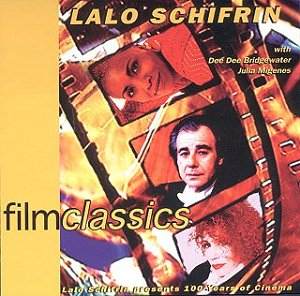
1: Medley: High Noon, The Magnificent Seven, The Good, the Bad and the Ugly 2: Casablanca - 'As Time Goes by' - instrumental
3: The Sandpiper - 'The Shadow of your Smile' Dee Dee Bridgewater
4: The James Bond Theme
5: High Heels - 'Piensa en mi' - Julia Migenes
6: Medley: Lawrence of Arabia, The Third Man, Dr. Zhivago, Zorba the Greek
7: The Fox 8: Raiders of the Lost Ark - 'March'
9: Gone With the Wind - 'Tara's Theme'
10: The Sting - 'The Entertainer'
11: Medley: La Strada, The Godfather
12: Movie song medley - songs from: Butch Cassidy and the Sundance Kid, the Wizard of Oz, Oefeu Negro, Bagdad Café, The Umbrellas of Cherbourg, New York, New York - Dee Dee Bridgewater and Julia Migenes
The subtitle of this release is as misleading as it is purposeless: as the oldest films represented here are Gone With the Wind (1939) and The Wizard of Oz (1939), both a mere 60 years old. That aside, this is a rarity among film music albums, a concert disc of music from the movies, conducted and partly performed by a leading film composer. Perhaps due to the rarity both of such concerts and subsequent album issues, the selections here are of a resolutely populist nature. This is an album devoted almost entirely to famous film themes, reminiscent to the days of Geoff Love Music For Pleasure anthologies, though Mr. Love never was able to employ such fine vocal talents as Dee Dee Bridgewater and Julia Migenes.
The opening Western Medley opens with a stirring orchestral rendition of a tune more famous as the song, 'Do Not Forsake Me', from High Noon (Dimitri Tiomkin). The Magnificent Seven (Elmer Bernstein) are quite strong enough to take care of themselves, and emerge from the centre of this three way shoot-out unscathed. More interesting is the opportunity to hear Schifrin's fully orchestrated arrangement of Ennio Morricone's definitive spaghetti western theme, The Good, The Bad and The Ugly. Purists may rebel in horror, but Schifrin retains the spirit of the piece, while turning it into something both more traditional and more spectacular than the original. If only more of the concert/album was like this.
Schifrin takes to the keys for a jazz-piano instrumental take of Herman Hupfield's 'As Time Goes By', not written for, but made famous by, Casablanca. This is the first track where something which should have been eliminated from concert recordings long ago can be heard: line hum. It's not a big problem at first, but if you have good speakers or headphones and listen loud, it does become clearly audible. By the end of the album it has become very irritating indeed.
Next up is a real highlight, Dee Dee Bridgewater's smoky and wonderfully rich voiced reading of Johnny Mandel's 'The Shadow of Your Smile' from The Sandpiper. Unfortunately 'The James Bond Theme' don't mean a thing, because it just ain't got that swing. It does suffer from a very loose guitarist who seems to be part of another recording entirely. Over the audience applause Dee Dee Bridgewater provides a terribly embarrassing moment by singing Lalo Schifrin's praises to the tune of 'Goldfinger'. Far better is Julia Migenes version of A. Lara and M.T, Lara's song, 'Piena en mi' from High Heels, which here plays like a leftover from Canteloube's Chants D'Auverge.
A crowd-pleasing montage of famous bits from Lawrence of Arabia and Dr. Zhivago (Jarre), The Third Man (Karas) and Zorba the Greek (Theodorakis) reduces these classic scores to pleasant middle-of-the-road tunes devoid of real dramatic impact, swiftly followed by The Fox, the only Schifrin score represented on the disc. Judging by a documentary about the composer shown on Channel Four last year, this would appear to be one of Schifrin's favourites among his own work. The film is a sensitive adaptation of a D.H. Lawrence novella, but here Schifrin has reworked the main theme into a showcase for his jazz piano. It bears little relation to the original soundtrack, and is too heavy-handed for jazz.
John William's 'March' from Raiders of the Lost Ark gets a routine reading, the epic quality of the soundtrack versions somehow eluding the Marseille orchestra, while Max Steiner's 'Tara's Theme' from Gone With the Wind can survive anything, this version being one of the stronger tracks on the album. Scott Joplin's 'The Entertainer', made famous by The Sting is jaunty, catchy, and sounds very much as I remember from the movie, but is it film music?
A homage to Nino Rota links his theme from La Strada with his most famous work, The Godfather. The circus highjinks are colourfully playful, but some nasty line hum detracts from the plaintive trumpet solo and somehow the violin melody just lacks the requisite intimacy. The Godfather works much better, and makes me wonder how much longer we are going to have to wait for a full CD representation of this music.
The album ends with a 16 minute Movie Songs Medley, with Dee Dee Bridge Water and Julia Migenes doubling up on songs from six movies. The problem is, these songs were not written for two voices together. There is no denying the quality of the vocal performances, but 'Over the Rainbow' can only work as an expression of a lonely individual dreaming of the future. Two fine singers swapping lines simply becomes meaningless, the whole point of the song sacrificed to the 'show'. The same applies to much of the rest, though individual solo passages stand out to the extent that one wishes to hear individual albums of movie songs by both these singers. A final barnstorming 'New York, New York' blows the cobwebs out and makes up for some lacklustre work earlier on.
This is a very mixed-bag of songs and themes. Not the sort of album to appeal to the serious film music fan, but perhaps a fair present for fans of the singers, and who also like popular film themes. Otherwise, a very dated release, not for the music, but for the approach of chopping-up film scores into easily digestible bit-sized pieces.
Reviewer
Gary S. Dalkin

Music from and inspired by the film. "Che!"
With Juanjo Dominguez (guitar).
ALEPH006 [46:41]
Save around 22% with
Amazon US
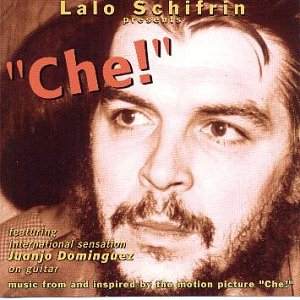
Che! (1969) was about Fidel Castro being helped in his subversion of Batista’s Cuban regime by an Argentinian doctor named Che Guevara. The film Che! starred Omar Sharif with Jack Palance (as Castro). Rerviews were uncomplimentary. ‘It goes at the pace of a drugged ox, and ahsn’t an ounce of political or historical sense in its nut’ was a typical appraisal (that quote came from New Yorker). Ah well! – the film did have some wonderful music from another Argentinian, Lalo Schifrin.
This is a fabulous collection of numbers that represent the exotic rhythms and vibrant colours of the music of Cuba, Argentina and the Bolivian Andes. Here is music that is fast and furious; slow and sultry; languid and romantic; and proud and haughty. It is music to stir the blood -- and the feet!
I give below the track listing – there is no point in attempting an analysis – just let the rhythms pull you from your chair.
Che!
Los Olvidados
La Columna
Tango
La Ruta
Emboscada
Malambo
Fiesta Numero DosRecuerdos
Charangos
La Ultima Careta
Los Andes
Anita
Fiesta Numero Uno
La Barraca
Che!The album features the fireworks virtuosity of Juanjo Dominguez. His fantastic playing has to be heard to be believed.
A great album to dance to
Reviewer
Ian Lace

music conducted by the composer
ALEPH RECORDS 010 [45:15]
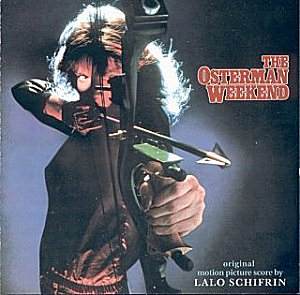
As so often with Sam Peckinpah, The Osterman Weekend (1983), the great director's final film, promised more than it delivered. Starting with an ingeniously plotted, if rather contrived Robert Ludlum espionage novel as source material, it could have been a movie thriller classic. Unfortunately the men in suits didn't allow Peckinpah to rewrite the not entirely coherent script, to cast his own first choices in leading roles, or to have final control over the editing process. The result was an entertaining, but frustratingly botched movie.
Lalo Schifrin's score is both in the lineage of his Dirty Harry urban thriller soundtracks, and very much of its time. Thus we have the agitated minimal jazz of Schifrin's 70's work, stark atonal textures, and elements of stripped-down instrumental 'almost' rock as pioneered by John Carpenter in his scores for his own films Assault on Precinct 13, The Fog and Escape From New York. 'The Osterman Weekend theme' opens with a choppy funk guitar riff, and when a brooding resonant synthesiser filter sweep glides menacingly across the soundfield expectations are raised, but then the track breaks into an upbeat jazz rock fusion piece in the style that was popular in the early 80's and any tension immediately evaporates.
'Face of Love' is a laid back easy listening jazz sax tune that might have suited Francois Lai's Bilitis, and is situated somewhere approaching the moon and New York city. Yes, Arthur was released the year before The Osterman Weekend. The suspense proper begins with 'Winter Games', dark jazzy atmospherics that really don't stand alone well, setting the tone for several other cues scattered throughout the disc. Meanwhile 'Restless Nights' is more cocktail sultry sax, pleasant but too middle-of-the-road to sustain interest. The main theme is put through some featherweight sub-Weather Report variations in 'Status Symbol', more the kind of thing associated with a Henry Mancini Pink Panther OST than a dark and savage thriller.
'The Love Theme' is distinguished by what sounds like a decidedly wrong note at 20 seconds in, but that is all. 'Newsbreak' is exactly as the title suggests, pastiche tv news report music. 'Omega' builds on a repeated, Carpenteresque two note riff, and does generate some suspense, but it is too little, too late. 'It's a Mystery' continues in similar vein, adding glacial wooden flute over repeated a five-note sequence, while 'Jesus Loves Me' is ice cold atonal minimalism. The final track, 'Face of Love' is another MOR sugary sax-led tune, rounding off a thoroughly un-engaging set.
This is a score which adds little to the film, and offers few pleasures indeed on disc - the mixture of lounge jazz and suspense tracks really doesn't add up to a coherent listening experience. Sound quality is good though, especially on the jazz tracks. The electronic elements tend to have that dry, thin quality which makes early synthesiser scores sound so flat and unappealing, and the album does have one notable credit - apparently Mr Schifrin had an 'electronic assistant', Gary Stockdale. The cover design is somewhat tacky, but the CD itself fits the subject of the film, being presented as an archery target with the only text being the copyright legend. Lalo Schifrin has written some fine scores, but this is not one of them. One for completists only.
Reviewer
Gary S. Dalkin

Hans J. SALTER, Herman STEIN, and Richard LaSALLE (The Derelict)
The Fantasy Worlds of Irwin Allen Vol. VII – Lost in Space
GDP-CESCENDO GNPD-8062 [69:07]
The Amazon sales link is for the boxed set of 6 discs
Save around 22% with
Amazon US
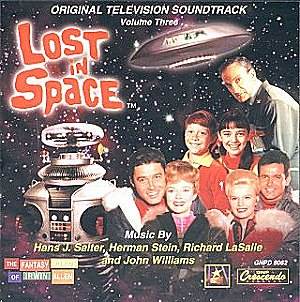
Presumably driven by nostalgia fuelled by endless repeats on satellite and cable television, there now seems to be an un-ending stream of albums related to old TV shows. Given that science fiction seems to engender more enthusiastic fans than any other genre, and that SF fans often have an insatiable collector's instinct, it becomes inevitable that many of these albums relate to TV SF.
Lost in Space was an Irwin Allen production, and this colourfully packaged GNP Crescendo release is Volume VII of The Fantasy Worlds of Irwin Allen, as well as Volume Three of the Lost in Space soundtracks, a sub-series of The Fantasy Worlds issues (which also include volumes devoted to The Time Tunnel and Voyage to the Bottom of the Sea). This album, which comes with notes by Executive Producer Kevin Burns, and two of the stars of the show, Angela Cartwright and Jonathan Harris, features the music from Lost in Space most requested by the fans. The episodes The Derelict and My Friend, Mr Nobody.
The Derelict is a patchwork score, with the early cues composed by either Herman Stein or Richard LaSalle, and most of the later ones by Hans J. Salter. Though Richard LaSalle's brief 'The Robot Performs' apparently contains themes composed by John Williams, and Williams also composed the hopelessly cheesy title theme included in this suite. While the notes tell us that the music from this suite did not often reappear in the series later on, it evokes clear memories of generic television music from the 1960's. It is all perfectly functional, mysterious, atmospheric suspense music, and would really seem appropriate to any of a thousand TV shows, from westerns to thrillers to dramas. Evocative of it's time, there is absolutely nothing wrong here, but it bears little interest as pure music. No doubt with the added benefit of nostalgia, it will delight die-hard fans of Lost in Space.
More general film music fans will doubtless to particularly interested in My Friend Mr. Nobody, being early science fiction music from a certain Mr. John Williams. Unfortunately, including the already mentioned title music, the John Williams music on this disc amounts to only 24 minutes. It is certainly better music than that for The Derelict, and contains enough hints of greater things to come to be of interest to the serious Williams fan - spot pre-echoes of any number of scores, from Jane Eyre to Jaws, Star Wars, Dracula and Empire of the Sun, to name but a few. Mysterious, lyrical, playful, tender, clearly Williams was developing his popular style here, even constrained by the impossibly tight deadlines of TV scoring. This is not great John Williams, by any stretch of the imagination, and there are none of the wonderful unforgettable melodies which we think of when we think of this composer. But if you love his music and know it well, you will find this worth hearing. How often you will play it is another matter.
The sound is mono, of limited dynamic range, but clear, without distortion and with minimal tape hiss. The album also contains a bonus track, the unused (and negligible) second season title music composed by Warren Barker. For the dedicated fan of Lost in Space, this disc would appear to be an essential purchase, equally so for the serious John Williams fan who has everything, including money to spend on fulfilling curiosity. Otherwise, despite all the obvious love and care which has gone into this release, this is not a disc I can really recommend.
Reviewer
Gary S. Dalkin

orchestrated (with Don Davis) and conducted by the composer
PROMOTIONAL JHCD-02 [74:01]
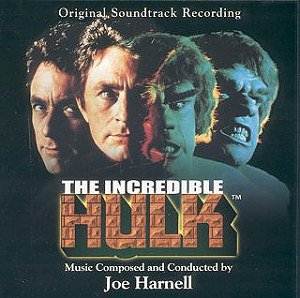
Joe Harnell may well be an unfamiliar name to most film music fans. Born in the Bronx in 1924, he toured with the Glenn Miller Air Force Band during the Second World War, and afterwards studied composition with Nadia Boulanger, William Walton and Aaron Copland. He came to television comparatively late, being the Musical Director on The Mike Douglas Show (1967-73), then writing for, among other shows, The Bionic Woman, V, Alien Nation and The Incredible Hulk.
This lengthy promo album comes with some useful biographical notes, though the unlisted blurb writer argues against all reason for the dramatic credibility for the show, which lacking the resources to bring the Marvel Hulk comic book to life, settled for a ludicrous sub-Frankenstein variation on The Fugitive.
The disc opens with the urgent, percussive and semi-electronic main title (electronics appear here and there throughout the album, but never at the expense of the orchestra), a typical 1970's American science fiction / cop show type of tune, given a decidedly polished arrangement. It is followed by the 'Love Theme from The Incredible Hulk', and although the notes do note confirm this, it appears to have been the B side of a 45rpm single, the A side of which ends this album - a disco version of the main theme. This was the late 70's, when such was the popularity of disco that every other movie seemed to have to have a disco version of the theme. Jerry Goldsmith provided them on his Logan's Run and Coma albums, and a disco single was even included with the original LP of John William's Close Encounters of the Third Kind score. All they serve to do is demonstrate that when one attempts to attach film music to current trends the result rapidly becomes embarrassingly dated.
The most interesting part of the album is tracks 3-7, a 27 minute suite from The Incredible Hulk pilot TV Movie. Incomprehensibly, track 17 is also from the pilot, and it would make infinitely more sense had it been sequenced directly after the suite - just as it would have made more sense to programme the two sides of the single together at the end of the album. However, the suite does allow for 5 extended tracks which build considerable tension and excitment.
'Gamma Ray Treatment' opens with reverb-processed metallic percussion, creating a lugubrious, mysterious atmosphere of the sort one might have found in a Bernard Herrmann fantasy score. Deliberately paced, a repeated cymbal figure adds an understated menace to strings and aqueous piano, such that overall there is a dark tone not dissimilar to the near contemporary television science fiction of Stu Philip's Battlestar Galactica. 'Growing Anger' has a propulsive clockwork momentum looking froward to Miklos Rozsa's time-travel motif from Time After Time, a device which will recur in several cues. 'First Hulk Out / Second Hulk Out / Transformation' has a relentless acerbity reminiscent of classic 1970's Jerry Goldsmith, and is a splendidly constructed and sustained example of suspense-action writing. 'Growing Tension / Explosion / Hulk Rescue and Susan's Death' has something of the stark string writing of Goldsmith, together with the minimal, honed percussion of Lalo Schifrin. The music for Susan's death includes a simple, melancholy melody which became known as 'The Lonely Man theme', a piano version of which ends the suite from the pilot.
The album continues with a second version of the main theme, but unfortunately there is no explanation as to where or when this treatment was used. Next we have cues from several individual episodes. Two cues each from Married and Prometheus, are bizarrely placed apart from each other. Intervening is music from Ricky and Homecoming, together with suites from two episodes of a 1979 series called Cliffhangers. The reason for this is that Harnell reused his music for this show in later episodes of The Incredible Hulk.
The first cue from Married 'The Wedding' is simply ghastly. Dominated by a nauseatingly sentimental sugar-coated choir, the track is further degraded by a marked rise in the level of tape hiss. The second cue from the episode, 'Prelude to Tragedy/Death Scene' is rather better, the lead violin for the 'Death Scene' part of the track harking back to the Hollywood 'Golden Age'.
'Arrival at Project Prometheus' from Prometheus is suspense music given a military flavour by the presence of incessant snare, while 'Through the Floor / Hulk on the Rampage' offers more of the high quality writing found in the pilot score. The short suite from Ricky delivers an attractive melody balancing harmonica and string orchestra, while the remaining cues mix action and suspense with elements of light jazz and blues, and classic horror aficionados may detect brief homages to Franz Waxman's Bride of Frankenstein and Dimitri Tiomkin's The Thing (From Another World).
The album is in mono, apart from the two tracks released as a single, which are stereo. The music from the pilot generally has a fuller sound than the series tracks, and listening through good headphones reveals more background noise than listening through speakers. Overall the sound is perfectly good, and considerably better than some recent releases of an equivalent vintage. One additional point of interest, particularly given the spectacular rise to prominence this year of Don Davis, is that the composer of The Matrix and House on Haunted Hill is here credited as co-orchestrator with Joe Harnell. Davis must have been very young at the time, but even so, there is a complexity and solidity of architectural structure to the writing which today can be heard reflected in Davis' own scores.
This album does outstay its welcome somewhat, but then having too much music is always a better thing than having too little, and no one can complain at a disc running 74 minutes. The odd sequencing is irritating, but then can easily be rectified by simply programming the tracks oneself, and there is certainly some surprisingly good music here. What would be really nice is if some enterprising company produced a new recording of the best of this music with spectacular modern stereo (or surround) sound. Nevertheless, this is a worthwhile release, and one which, unlike so many tv related albums, can be enjoyed by anyone interested in well-crafted action adventure music.
Reviewer
Gary S. Dalkin

P.O.V Records POV 1103 [44:47]
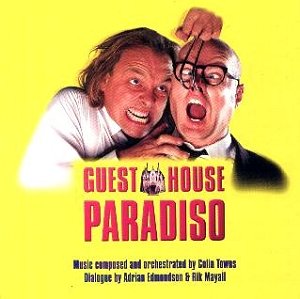
If you know Ritchie and Eddie, then the concept of this album won’t surprise one bit. There’s plenty of profane language and cartoon-like sound effects. If you really know the duo, then Towns’ anarchic jazz score won’t be a huge surprise either. As The Dangerous Brothers, this was the sort of thing that suited their chaos perfectly.
The dialogue might become annoying after a couple of listens, but this is music that should continue to amuse and amaze. A great show piece is Gold Teeth Tango in which the tempo winds down as if disconnected from a power source. Then there’s the half-cut saxophone of "Happy Hour" which shambles its way through the saloon doors.
Surprisingly, there’s a little romance. Surprising both in the sense that the pair should finally manage to find a woman (!), and also in something like Miss Carbonara offering tenderness amidst such sheer insanity. It’s perhaps an acquired taste. But ever since The Young Ones, that’s always been the case.
Reviewer
Paul Tonks

Ian Lace adds:-
Rik Mayall continues to draw the most uncomplimentary comments from the critics and Guest House Paradiso is no exception. The under-graduate toilet humour on this disc is a total embarrassment and I am surprised that Colin Towns has chosen this vehicle to launch his new label. I would prefer to forget its inanities and anticipate the promised Catherine Cookson material.
Reviewer
Ian Lace
Music:

Dialogue



[P.O.V. Records: P.O.V. Records is the new label established by Colin Towns, one of the UK’s most prolific TV composers. The label is dedicated exclusively to producing soundtrack albums. Following the release of Guest House Paradiso, P.O.V. Records will be producing The Catherine Cookson CD Collection Part ! from the last three television adaptations of Catherine Cookson’s dramas, including the new score from the forthcoming The Secret. This album precedes potential future releases of music talken from all Catherine Cookson television dramas.]
Music for BBC Television Programmes
Soundtrack to the BBC television film conducted by, and featuring piano solos by the composer
BBC WMSF 60192 [45:32]
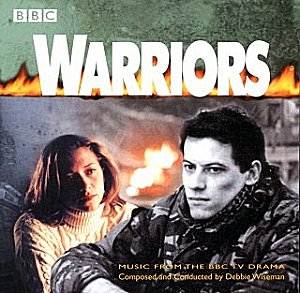
Here is the contradiction: men trained for war, under orders to keep the peace. The enormously powerful BBC drama Warriors follows a British battalion of the UN peacekeeping force in Bosnia in 1992 (it is actually one of two recent BBC dramas produced to mark a century of conflict, the other being All the King's Men). Their fellow soldiers, those sent to Northern Ireland, think of Bosnia as a soft option. Warriors shows it was anything but, to be ordered to not intervene to save the lives of people you know are going to be massacred, people you have in some cases come to know, even to love, but always, even if total strangers, human beings. Thus Warriors is about the gulf between war and peace, and about the purgatory between. It is also, through the soldier's relationships with wives and sisters and girlfriends and grandmothers, and with the women they meet in Bosnia, about the gulf between men and women. Almost entirely, men cause the violence, the women endure, and towards the end of the drama, bring new life into the world. The unaccredited artist who designed the cover of the CD latched onto this theme: a woman, warm, in colour, looking at a man, cold, in black and white, who is looking away from her, at us, or at nothing. Alienated, lost in a personal hell amidst a collective one.
Without music, Warriors would be such a dark, documentary-like portrait of hopelessness and despair in the face of human evil as to be all but unwatchable. In such a drama the choice of music becomes vitally important. Director Peter Kosminsky chose wisely in selecting Debbie Wiseman as composer for the film - they had previously worked together on The Dying of the Light. Her music provides the humanity the soldiers gradually sacrifice in order to cope in a nightmare reality. It is never melodramatic, always understated, a lament, yet filled with such beauty as to be inherently optimistic. If beauty can still exist, then so can hope, and while the film ends, schematically, in the depths of despair, Wiseman's eloquent music suggests that order can yet be resolved out of chaos, that redemption begins at the darkest moment of the long night of the soul.
The first 15 minutes of the film is set in England, and shows the soldiers off-duty, at home with family or out on the town. Apart from a brief title, there is no score, only source music. Then the battalion is in Bosnia, a patrol is driving slowly though the streets of a city. We, with the soldiers, have been transported to an alien world. The music, 'Arrival in Vitez', records this with understated intensity. The men are alone, overwhelmed, in a world of deprivation, a harsh city of tower blocks and sporadic violence, yet they are safe, protected by their UN status while around them is death. They are stunned, and the music reflects the enormity of the transition.
I asked Debbie Wiseman about her about her approach to the score, and this is what she said:
I was left completely emotionally exhausted after I first saw "Warriors". Such a powerful piece needed careful scoring and after many discussions with the director Peter Kosminsky we agreed that the sadness of the piece shouldn’t be over-sentimentalised in the music. I composed a central theme which was woven through the film, using ethnic voices and flutes, strings and percussion. It was intended to sound as naturalistic and effortless as everything else in the film - almost like a Bosnian folk song that could have been heard by the soldiers while they were there.
It is these voices, this song, which is the real stroke of brilliance, so obvious, that like all great scores, it seems inevitable, after the fact. The first time I heard a sound like this was on Kate Bush's Sensual World (1989). Bush used a trio of Bulgarian female traditional singers on several tracks, and the result was extraordinary, certainly in pop music at that time. Here there are four voices, Mary Carawe, Helen Hampton, Mae McKenna and Nicole Tibbels. From the recorded sound one would not know that they were British, (Mary Carawe has recently appeared on several Chandos releases, while singer-songwriter Mae McKenna has at least one solo album to her credit which is stylistically more Celtic than central-European). Here the quartet sound entirely appropriate to the setting, and the recording makes the voices distant, detached, their emotional power implicit more than dynamically explicit. The women mourn, while all around the world collapses.
The music is used sparsely, there is just 45 minutes of score in a drama lasting 174 minutes. It is music of grave, austere beauty, solemn, sombre, reverential. Spare and unflamboyant, this score says exactly what needs to be said to shine a light in the darkness. In the stark string textures, and the resigned yet infinitely expressive sound of the voice or the wooden flute, there is something of the spiritual quality of the music of Avo Part, of the clean, elevated sound obtained by recordings on the ECM New Music label. It is appropriate, as if this music has been purified in the flames of conflict, and survived, refined.
Each of the 17 tracks is perfectly crafted, such that the album flows as a single work, if not in form, then in function, a requiem. Wiseman's themes are simply heartbreaking in their tranquil sadness, and as such, singling out individual pieces is less effective than considering the score as a whole. That said, the piano solos of 'Nothing to Say' and the final 'Far From Home' (played by Debbie Wiseman herself) express more than writing about them ever can, while the vocal sequences capture the endurance of war more powerfully than Oliver Stone ever achieved with his appropriation of Barber's Adagio for Strings for Platoon. Warriors is a very fine film, something we have to a very large degree to thank Debbie Wiseman for. Equally, the soundtrack release is an exceptional album, one of those rare discs to be recommended without reservation.
Reviewer
Gary S. Dalkin

soundtrack to the BBC television film. The BBC Concert Orchestra conducted by Terry Davies
BBC WMSF60172 [42:34]
Save around 22% with
Crotchet
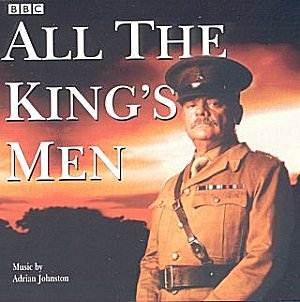
Director Julian Jarrold's All the King's Men is one of two recent BBC television films, the other being Warriors, commemorating a century of warfare. Based on the true story of a British regiment lost in Turkey in the Great War, the drama comes with suggestions of possible divine intervention, atmospheric photography, a parched, timeless landscape, and flashback narrative structure, inviting comparisons with two films by the Australian director Peter Weir: Picnic at Hanging Rock and Gallipoli. This is not in the class of the former, and being a television production inevitably lacks the scale of the latter, but it is a powerful and moving, if at times laboured, study of the consequences and denials of war.
Adrian Johnston, who scored Jude, Our Mutual Friend and Shooting the Past, has crafted a score which is by turns delicately atmospheric, foreboding, eloquently elegiac, and intensely moving. His themes are deeply melodic, at times unbearably intense with a near Elgarian quality.
Just as did The Deerhunter, the film spends a long time at home with the soldiers, introducing them to us before they go to war. The first 11 of the 26 tracks depict life on the Sandringham estate in 1915, which was something of a romantic rural idyll if this version of history is to be believed. Unfortunately, the problems begin just 36 seconds into the album. 'The Legend' is a dreamlike theme for strings and harp, utterly ruined by being senselessly covered with a monologue from near the end of the film. So it goes, 'The prelude' is another piece of brooding atmospheres, destroyed by breathing sounds, then a gunshot and a horse bolting. In total half the tracks on the disc suffer to a greater or lesser extend from the inclusion either of monologues or sound effects. They never add anything, and in places detract to the point of making the music unlistenable.
There may just possibly have been a place for this kind of 'aural film souvenir', in the days before video. Now, if anyone wants to hear the music again in its original context, all they have to do is play the videotape again. Surely people buy soundtrack albums because they want to hear the music away from the film, as a separate entity. What makes this example particularly bad is that there is no warning on the cover that this is not a conventional, music only OST. Customers have a right to know what they are buying, and from the presentation, that would appear to be a perfectly normal soundtrack album. What is yet more irritating is the arbitrary nature of the placement of effects and dialogue: why just these effects, why not more, or less? Why not more, or less speech? Why, if this approach is to be taken, not simply release the soundtrack exactly as it appears with the film? Strangest of all, the album has been produced by the composer, as if Adrian Johnston felt that his own music was not sufficiently interesting to survive without being 'spiced-up'.
Given this presentation, it is often difficult to enjoy the score. However, there is some fine music. 'Paradise' shimmers like a jewel, 'Norfolk' evokes the endless melancholy at the heart of the English pastoral tradition, while the rising string theme which marks moments of intense drama, and is first heard in 'Farewell', has a majestic gravity which makes one wish Adrian Johnston could be allowed to re-score Titanic.
So, a excellent score, seriously damaged by its own composer for the transfer to disc. It is probably too much to hope that this CD will be withdrawn and a proper soundtrack album issued instead, but in this form, outstanding as the score is I can really only recommend it if you should find a copy at budget price.
Reviewer
Gary S. Dalkin
Score

Presentation on this album

soundtrack to the BBC television series
BBC WMSF6013-2 [48:57]
Save around 22% with
Crotchet
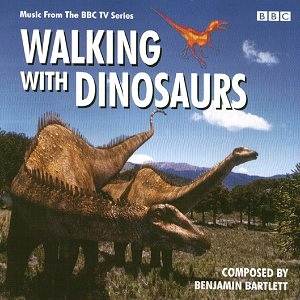
Walking with Dinosaurs is an ambitious documentary project undertaken by the BBC, which brings, once again, the long-extinct Dinosaurs back to life, utilising state of the art CGI. The BBC approached the Dinosaur theme from a different viewpoint than Spielberg and many others before him, that is, they described the life of those magnificent creatures in their natural habitat as it has been millions of years ago. The human element is completely absent in this context. This doesn't mean that the documentary is void of dramatic elements. A wide range of emotions are denoted on screen: there is the struggle for life, danger, death, even emotions like affection and love. The six different episodes of the series explore a different part of the Triassic/Jurassic life, such as the Desert, the Sea, the Sky etc.
Newcomer (actually this was his first break to the screen apart from commercials) Benjamin Bartlett was summoned to score all six episodes of the documentary. The score, performed by the BBC Concert orchestra, contains everything we could expect from a Dinosaur feature: larger than life themes, bold brass statements, timpani, lush melodies, and eerie soundscapes.
The CD commences with a narration by Kenneth Branagh that adds a fairy-tale touch to the score, while the composer demonstrates that he is quite able to adapt musically, by changing the style of his music in each episode to satisfy the continuously changing drama. Or at least that he has done his homework. Every part of the series seems to be appropriately scored: relentless, jungle music for the fight of two Torosaurus, exciting, hunting music, based on strings and brass, and subtle melodies for the "Death of the Postosuchus", grand, brass and jolly themes for the flying creatures, harsh, eerie music to accompany the hidden predators that lurk in the night. The peaceful Titans have their own magnificent theme, which, rendered by strings and brass, is full of grace. Rhythmic, menacing music highlights the dangers of the "Canyon of Terror", with percussion, strings, bells and occasional brass outbursts. The vastness and the coldness of the sea is denoted by a delicate synth motif, assisted by winds, strings and some sound fx which convey the feeling cold and emptiness very efficiently.
Bartlett's musical voice doesn't add anything particularly new to the genre. He borrows the style from different composers and skilfully integrates them into this score. On the other hand, his composition is detailed and textured, orchestral colour is not absent. He demonstrates that he can score for a variety of emotions, to musically adapt to the drama on screen, producing in the meantime an enjoyable listening experience that does not lose its strength even when detached from the screen. It would be unfair to compare it to Jurassic Park. The only thing I could say is that it is quite different. All in all, the score is not exceptionally original. It is all that you would expect from a Dinosaur feature. But it is good!
Reviewer
Kostas Anagnostou

soundtrack to the BBC television series
BBC WMSF 6016-2 [44:26]
Save around 22% with
Crotchet

Eureka Street, a TV series created by the BBC, narrates the story of two people from Northern Ireland, trying to make their way in life through sectarian and political polarisation. The two characters are quite opposite in nature, Chuckie is a jolly man who hits the big time when he comes up with a business idea, and Jack is hard and moody, always getting into trouble.
The music by Martin Phipps reflects these two strands of the story. It is worth noticing that although the story takes place in Northern Ireland (mainly Belfast) the composer refrained completely from using the traditional Irish music idiom and instrumentation in favour of a more common orchestration based on strings, electric guitars, mandolin, some brass and percussion spiced-up with synths.
The score revolves around two themes: One for Jake and the other for Chuckie. The themes assume the identity of the characters they portray musically, that is, Jake's theme is hard and moody but full of lust, while Chuckie's is uplifting and carefree. As a whole, the score is an odd mixture of styles, orchestration and motifs. From the harsh, deprived of melody, synth and electric guitar opening combined with narration from the movie, to the joyful mandolin theme of Chuckie, to the tango in Track 5. "Eureka Street" itself is blessed with a light-hearted theme, blending mandolin, guitars and synth, in a way which is reminiscent of Chuckie's theme.
The score is quite predictable. The mandolin-based theme, with some variations, is utilised to underscore the part of the story referring to Chuckie, the harsh synth and electric guitar themes follow Jake. To interweave those two distinct sounds together the composer attaches a number of secondary motifs as musical passages between those two dramatic elements, alternatively mournful and optimistic. A wordless female voice is sparingly added to the spectrum of instruments, providing the score with an enchanting touch.
All in all, it is an interesting score. It seems like TV scores are receiving some attention after all, and becoming more detailed, contributing more to the drama on screen. The score under consideration although it is not characterised by great complexity or variation of themes, captures the tone of the series quite well. Its themes, heavily contrasted, propagate alternating moods of happiness and melancholy. The tracks that contain narration over underscore are quite powerful, especially Track 18.
It makes for a nice listen, but not a memorable one.
Reviewer
Kostas Anagnostou

Ian Lace adds a few brief overall comments about all four albums:-
BBC were kind enough to send me duplicate copies of all four albums so I had a chance to hear them all. The first point I would make is to echo the sentiments of Gary in his 1999 review of the year’s film music. With world-wide marketing, BBC have awoken to the fact that their programmes must have imposing scoring to match the imposing scope of programme content. Not so long ago, I was continually moaning about weak, anaemic, derivative and under-nourished (in terms of instrumental forces available) for such programmes. Thankfully, those days are behind us and I look forward to admitting more and more television scores for review to this site.
Specifically, I share all Gary’s reservations for All the King’s Men, the weakest and most derivative of the four scores; I admired Debbie Wiseman’s humane score for The Warriors – quite clearly a woman’s touch was needed here (although I was a little concerned that some of her material seemed like hand-me-downs from some of her recent scores). I was more impressed than Kostas with Bartlett’s highly evocative music for Walking with Dinosaurs. I hear all Gary says about the dialogue spoiling All The King’s Men but I would suggest that the reverse is the case with Eureka Street. I will admit to being a great lover of all things Irish and having a great sympathy for the predicament of Northern Ireland. Eureka Street was a brilliant black comedy that was recently screened on BBC 2 -- and it did not pull its punches. I was therefore delighted that the more pungent speeches were included none more so than Chuckie’s impassioned TV broadcast. Unfortunately the people who made this recording chose to favour the music in the most inappropriate places and some of Chuckie’s wonderful tirade is all but drowned.
A very promising collection.
Eureka Street All the King’s Men Walking With Dinosaurs The Warriors Ian Lace
TV series
GNP Crescendo GNPD 8060 [66:31]
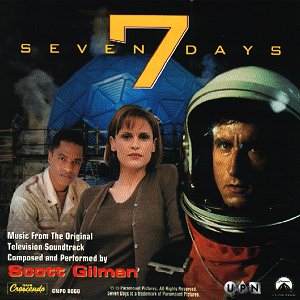
This is very much a TV score of the nineties, with a consistent supply of sampled percussion and rhythms bordering on dance music backing. The great thing about its use here however, is Gilman’s melodic sense keeps it from completely dominating the mix. The cues from 3 episodes are edited together to form lengthy suites, and without an attentive eye on the clock, it’s tough tracking what was where. Moments of tenderness come and go (e.g. "Clary’s Funeral"), but mostly the mood sustained is one of brooding tension and / or hijinks adventure. The catchy Main Title motif appears every so often in an almost Indiana Jones-like fashion.
At over an hour it’s a generous representation of the series, but perhaps slightly too much on the ear.
Reviewer
Paul Tonks

Kostas Anagnostou adds:-
A machine made out of parts from an Alien spaceship, allows one man to travel back in time for seven days in an attempt to a prevent any great catastrophe that took place in the past. This the familiar formula which Seven Days, a TV series, is based to create a modern rendition of Well's Time Machine.
The CD contains music from 3 episodes of the series, composed and performed by newcomer Scott Gilman. The essence of the series is a constant battle against time and this is well reflected in the score. The composer dressed the series with a synthesised score, over a constant layer of beat, electronic percussion and snare drums, that doesn't seem to be suppressed at any point in the score. It fires off quite promisingly with the "Main Title" that contains dialogue. The synthesised theme sounds quite familiar, but it is enjoyable nevertheless. Following this brief glimpse of thematic development, comes almost never-ending action/chase music, produced mainly by a drum machine, that quite successfully builds time-constraint panic and suspense. The action motif does not alter significantly between tracks, repeating with just small variations. Quieter passages are often interchanged with the action tracks, mostly void of thematic content, never escaping the underlying percussion layer. These slower parts are underscoring in nature and do not have a big dramatic impact. The main theme, sparingly utilised in some tracks, drowns in a thick cloud of beat and percussion, and seems incapable of elevating the score. Not many tracks stand out.. Besides the main title, "One More Time" is a quite light-hearted, fast-paced and enjoyable track, albeit too short.
Seven Days is a constant medley of electronic, rhythmic music over multiple layers of beats, that may stand sufficiently well on screen, but collapse as a stand-alone listening experience. The relentless beat becomes annoying at length and incoherent, causing attention to drift. There is insufficient material to interest the ear.
Reviewer
Kostas Anagnostou

OST
INTRADA MAF-7018 [44:49]
Save around 22% with
Crotchet
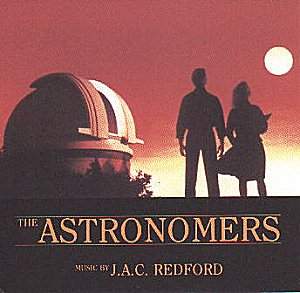
Scientists say the universe began with a scorching Big Bang, an incinerating cauldron of all the mass in existence then and now aggressively expanding to sculpt celestial objects. Now the universe is cooling, still forming, and many billions of years from today as the
last stars 'die' or turn into black holes they will eventually sweep heat from existence, plunging the whole of our finite state into absolute zero, the definitive frigid temperature, until the Big Crunch.
The temporary occasion for humanity to view the wonder and beauty of this milieu in our already short lives gives emphasis to the focus of J.A.C. Redford's score for 1991's six-part television docu-series "The Astronomers:" the secrets of the universe and those dedicated to uncovering them.
Redford uses cello, guitars, saxophones, synthesizers, and woodwinds in combinations for, as the liner notes by Redford state, "Slavic folk dances to electronic 'space' music, from jazz to 'classical' chamber music." The main theme is a simplistic hymn-like melody that brings a fair amount of heart to the cues... despite being predictable. The
closeness of this collection gives a definite New Age feeling, and while the technical credits are estimable the ability to appreciate the score depends on one's mood, rather than the music having the power to swiftly change one's mood as great works tend to do. The composer's message tackles the musical and emotional approaches by episode, but
does not challenge the intrinsic flaw of having a small ensemble try to sound big. It depreciates the effect.
The Geminids meteor shower is peaking as this review takes shape, and "The Astronomers" is playing in the background. The faults fade into a night of shooting stars. But the astonishment can happen on any clear night. Although the soundtrack does not function ideally, a key enthusiasm holds interest. With the right atmospheric conditions, it could soar.
Reviewer
Jeffrey Wheeler

Curio Corner
(With texts from 6th to 11th Century Ireland and Wales; 16th to 19th century Scotland, Brittany and Cornwall, and the Ordinary of the Mass. Original adaptations and lyrics: John Cameron) Máire Ni Chathasaigh (folk singer and Irish harp); Lindsay Wagstaff (soprano); Emmanuel Lawler (Gaelic tenor); John Bowley (Latin tenor); Michael McGoldrich (uillean pipes) The Choir of New College Oxford and the English Chamber Orchestra conducted by the composer
ERATO 3984-25494-2 [66:20]
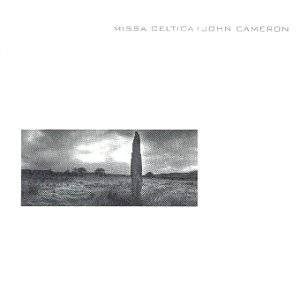
Blest be the man from the island of Colum Cille
Bringing the word to the lands in the east
I enjoyed this music immensely; in fact I would go so far as to say that this is my British Music (or, perhaps, I should say Irish) CD of the year. John Cameron has written a glorious, melodic, accessible and often deeply moving celebration of the passing back of the word of Christianity, during the dark ages after the fall of the Roman Empire, back from the havens of learning that were the abbeys of Ireland, isolated on the north-west tip of Europe. Missa Celtica is the story of the lives and journeys of the Celtic Saints in the 6th and 7th centuries, in particular Collumcille to Iona and Scotland, Aiden to Lindisfarne and Northumbria, and Columbanus and Gallus to Luxeuil, Lake Constance and Lombardy.
John Cameron read History and Music at Corpus Christi College Cambridge. He has had many successes in many fields: Jazz, Pop and film and television work (including writing over 40 film scores including: Kes, A Touch off Class and Black Beauty). His work on José Carreras’ ‘Passion’ (where he was executive music director and principal arranger) led him eventually back to Cambridge and the comparative calm of New College, working with the Choir on their ‘Agnus Dei I and II’ and ‘Early One Morning’ albums. In Missa Celtica he has attempted to unify all his many different musical languages. He blends a cappella choral singing in the Ordinary of the Mass: the Kyrie, Gloria, and Sancti Veniti, with Irish and Scots Celtic themes. His choral music is a blending of his 20th-century style with the free psalmodic/organum tradition of early ecclesiastical themes.
Missa Celtica begins with solo uillean pipes. The pipes’ theme is developed by the Choir in the Kyrie and the Irish harp intersperses sparkling, brightly flowing figures suggesting the beauty of Erin. A strident and forceful battle hymn on the orchestra based on strongly rhythmic figures, follows. The Gaelic tenor soloist (Emmanuel Lawler) sings gently and eloquently, the beautiful and moving ‘Hermit Song’ -- ‘I wish…for a tiny hut in the wilderness… a lark to sing me the risen sun…And Twelve good men who are sound and true To help me to sing to the Lord.’ Dramatic and turbulent music then follows depicting ‘Colum’s Voyage.’
I could go on to describe all 22 tracks on this CD but I think from what I have written thus far you will have a very good impression of this work. I will therefore just mention two or three movements that particularly impressed me. Of the a capella movements the Gloria is a radiant creation and it is repeated as a joyful almost secular celebration with orchestra. ‘Bridget’s Descent’ (sung warmly with nice articulation by Lindsay Wagstaff) is a lovely hymn for voice and violin praying for the Lord’s protection, while ‘Let Us Sing Every Day’ with pipes and drums prominent is again joyful and strongly rhythmic. ‘Collum Cille’s Elegy’, with its high sustained chords, quiet violin and harp accompaniment to Lawler’s rapt delivery is deeply moving. So, too, is the following ‘Sanctus/Benedictus Lindisfarne’ with the Choir singing a most beautiful setting of the Sanctus followed by a lilting Gaelic rendition of Aiden’s calling to Lindisfarne from which I have taken the quotation at the head of this review. This movement is a glorious highlight of the work. Finally, I would mention the radiant ensemble, the closing blessings of ‘Pax Deit’ that closes this remarkable work.
The singing of soloists, and the New College Choir and the playing of the English Orchestra are practically beyond reproach. Outstanding; a work to marvel at from beginning to end.
Reviewer
Ian Lace

Royal Ballet Sinfonia conducted by John Wilson
ASV CDE WHL 2123 [70:46]
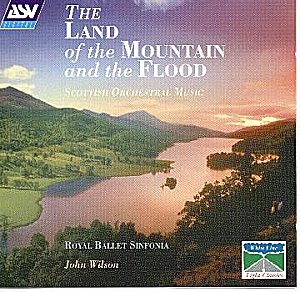
Hamish MacCunn (1868-1916). This lively concert kicks off with MacCunn’s The Land of Mountain and Flood, probably the best-known and best-loved of all the pieces on this disc. And what a fine reading John Wilson gives us: thrilling, and splendidly paced and articulated. Amazingly, this self-assured composition was penned when the composer was only nineteen. The programme also includes MacCunn’s Highland Memories written ten years later in 1897. Over its two opening movements, By the Burnside and By the Loch, this composition is quieter and sweetly nostalgic, while Harvest Dance is an unlikely marriage of the main theme of the second movement of Schubert’s Great C Major Symphony and Charlie is My Darling!
Muir Mathieson (1911-73). Mathieson is of course remembered for his huge contribution to the music for British films. He not only persuaded many influential composers like Vaughan Williams to contribute scores but he also skilfully arranged and orchestrated others’ film music. But he was also an accomplished composer as his Suite – From the Grampians proves. Loch Laggan, a stirring march, based on his march which opened each day’s transmission of Grampion Television, is followed by the serene and captivating Shuna – Island Song. In Glengarry – A Highland Steam, is a sparkling, shimmering little evocation while The Spital of Glenshee – Strathspey and Reel is spirited, with all its twists and turns and accents beautifully articulated by the Royal Ballet Sinfonia players.
Marcus Dods (1918-84) became assistant to Muir Mathieson but later took charge of such films as Far From the Madding Crowd and Death on the Nile. He is represented by his little Highland Fancy, written for his second wife, Deirdre Lind when she was principal oboe in the BBC Concert Orchestra.
Muir Mathieson’s cousin Cedric Thorpe Davie (1913-83) was prolific; his output included music for radio, theatre and 24 films. He is represented by his Royal Mile – Coronation March, composed in 1952 in anticipation of the celebrations of the Coronation of Elizabeth II the following year. The work inevitably has a strong Scottish character.
Buxton Orr (1924-97) is represented by his Fanfare and Processional which is quite self-explanatory, except that this piece of brass writing is for strings, but it is nonetheless imposing.
Iain Hamilton’s (b. 1922) Scottish Dances are another lively and colourful invention. They blend traditional and modern forms so that on occasion you feel as though you are in the world of Saturday nights in the dance halls of the early 1960s.
Sir Hugh Roberton (1874-1952) was, oddly enough, a funeral director by profession. He wrote or arranged many fine pieces for choir. By far the most popular was All in the April Evening. Included here is Philip Lane’s arrangement for strings. Lane also acted as producer on this album.
A highly enjoyable album and another feather in young John Wilson’s cap.
Reviewer
Ian Lace
Performance
The music:
Land of Mountain and Flood
The others

Big Band conducted by Wynton Marsalis
SONY SK51239 [60:03]
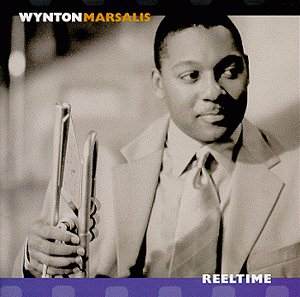
Wynton Marsalis’ epic series ‘Swinging into the 21st’ continues with another jazz disc.
This is where he is really at home as we must confess that his string quartets were absolute turkeys, to put it mildly! Here we have twenty-one virtuoso tracks all using various established names in the jazz scene coming together under the Marsalis bandwagon and the feel of pure jazz class amongst these talented musicians is quite disarming. This is also strictly American territory here with the sweet sounds of ‘Sing On’ Rosewood and the homely Porch Whiskey getting us into that traditional Creole spirit. You cannot fail to stare mouth opened when listening to the tricks Marsalis’ plays with his hallowed trumpet and the accompanying musicians are a dab hand especially in the sweet and sexy ‘I Heard a Knockin’. I enjoyed the big band items best, the suggestive ‘Fire in the Night’ is really quite special. I could go on singling out the diamonds in the pack but Reeltime could save the 21st century face, its big time jazz nonetheless. Enjoy!
Reviewer
Gerald Fenech

Original TV series recordings compilation
RHINO R2 75480 [59:44]
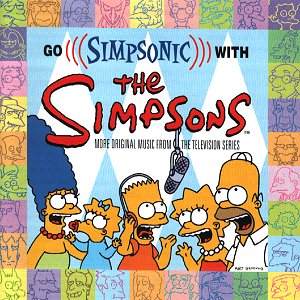
This CD is a compilation of music from various episodes of the famous TV-series The Simpsons. It is less composed than adapted (although this fact is never mentioned in the package) by Alf Clausen who apart from the mail title (composed by Danny Elfman) has created music for the series since 1990.
The Simpsons is a parody of everyday life, as well as of many movies, musicals etc. For that reason, a lot of well-known themes and songs, such as songs from Evita, The Sound of Music, Marry Poppins, and The Flinstones -- just to name a few, appear in the compilation, albeit with different lyrics. A lot of musical styles are interlaced in the score, too, from country/western music to cabaret music. The music is often quite funny, and the overall comic feel is enhanced by hilarious dialogue from the series. Understandably, the compilation lacks any coherence since it constantly leaps from one style and theme to another, intermixing dialogue and songs.
Hardcore fans of the series will appreciate this compilation. Others may or may not put up with the quite annoying voices, that are extremely funny when combined with the visuals, but of questionable entertainment value detached. The music just doesn't seem complete enough without the accompanying cartoon; it’s OK for a couple of listenings,
but it will not hold your attention for very long.
Reviewer
Kostas Anagnostou.

Michael Foster Project: Live at Donna's Kick some BrassFred Jackson - Alto Sax, Frank Williams - trombone, (Lft-Rt--sitting) Wendel Tilford - trumpet, Ronald Moss - drums, Michael Foster leader- Sousaphone, Kier Johnson - Tenor Sax (Lft-Rt--standing)
Rampart Records RR002
$15 +$3 postage Obtain from Donna's Brass Band Headquarters, In the French Quarter, Corner of St Ann & Rampart Streets, 800 N Rampart St, New Orleans, LA 70116. (504) 940-5442 Fax (504) 940-0197 rampartrec@aol.com
downloadable files http://www.Donnasbarandgrill.com/rampart.htm

1.Mardi Gras Funk 2.Kick Some Brass
3.Big "T" Daddy
4.It Ain't my fault
5.Chicken Grease
6.Cat House 7.Bourbon Street Parade
8.When It All Comes Together
9.Down By The Riverside
10.When The Saints Go Marching In
Michael Foster-Sousaphone, Frank Williams-Trombone, Kier Johnson-Tenor Sax, Fred Jackson-Alto Sax, Wendel Tilford-Trumpet, Ronald Moss-Drums, Anthony Jackson- Bari Sax, Maria Foster -Percussion
To the regular UK jazz fan a line-up of Trumpet, Trombone, Alto, Tenor, Sousaphone and Drums would not be what any of us were expecting, it is only when you realise that the Michael Foster Project combine Night Club appearances, with the role of a traditional New Orleans Street Band, that everything starts to fit into place. After all the well known Dirty Dozen have already made the street band into an art form!
The first four tracks are all Michael Foster compositions, each is tuneful and well suited to the band. As all of the musicians involved are highly trained and well qualified, you would expect a quality performance, but it is the obvious enthusiasm of the band that makes this CD exciting. The jazz influences range from the Delta to Coltrane and beyond, there is no limit to what these guys can do. Frank William's trombone solo on It ain't my fault was particularly well constructed and interesting, although all the soloists have something worthwhile to say.
Michael Foster has some mighty "chops" to get round the Sousaphone the way he does, most of the time he plays the base line but uses the instrument in the front line on most ensembles. The band have appeared at many jazz festivals in the USA and I would recommend them to European Festival Director's, as a band who can play anytime anywhere, there is a shortage of good band's of that type on the UK scene anyway.
I was particularly intrigued by the way the band tackled funky numbers, without the usual rhythm section this can sound lumpy and stilted, these guys can do it. Their repertoire is very varied and on the CD three traditional tracks Bourbon Street, Down By the Riverside and When the Saints Go Marching In are played with the same enthusiasm as the original compositions.
Personally, I have not heard a lot of this kind of music, there are not many New Orleans Marching Bands in Coventry! If they play any where in the Midland's in the future, I will be there to hear them, for sheer enthusiasm they are unbeatable.
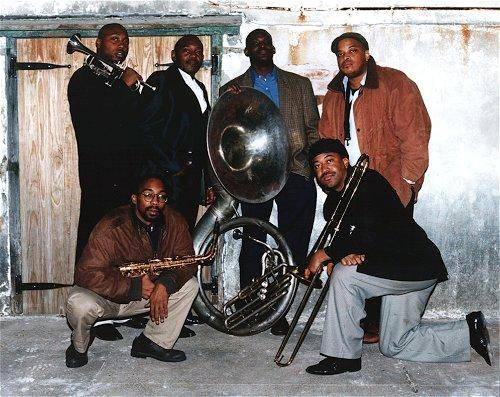
Reviewer
Don Mather

Don Mather plays Tenor Sax and Clarinet and runs a Big Band in Coventry
Book Review
MUSICHOUND SOUNDTRACKS - The Essential Guide to Film, Television, and Stage Music Edited by Didier C. DeutschVisible Ink Press. ISBN:1-57859-101-5 $24.95
Amazon $19.96
Save around 22% with
Amazon US
Now that my own copy of this marvelous, indispensable book has arrived, I am delighted to add my own personal review to that of Jeffrey Wheeler, which appeared on this site last month.Before commenting, I add a few facts culled from the publicity blurb that accompanied my copy: The book -- "…rates and reviews 3,000 soundtrack recordings available on CD. The CDs are reviewed in an A-Z format with each identified as film, television or stage soundtrack. Each entry provides complete production information and a review that takes into consideration production quality, musical quality, and the degree to which the music relates to the dramatic work that it supports. Finally, each entry is awarded a traditional Musichound "bone" rating, from 5 bones (superb) to "Woof!" (a real dog). Five indexes make for easy cross-referencing. Following the A-Z entries there are two sections on compilation albums. The first covers compilation as based on themes ("Great Epic Film Scores"), sub-genres ("British Film Music") and actors and directors ("Music from the films of Astaire and Rogers"). The second reviews composer compilations ("Sondheim: Putting It Together"), of which there are many…"
I must congratulate Didier C. Deutsch on an absolutely first class, meticulous job. I was delighted to notice that he and I share the same tastes. Time after time I found myself agreeing with his assessments. The Forewords by Lukas Kendall (so well known to readers of our pages) and Julia Michels are thought-provoking and I was intrigued by many of the enties under the heading 'They Know the Score' in which 23 composers comment on their music. Luis Bacalov, for instance, relates how he was chosen to write his Oscar-winning score for Il Postino at the very last moment and how the film and his score were smash hits. Danny Elfman confesses that he "was raised on film" and that his musical experience "is all via film, it's not from classical music…" He says, "…all my understanding of orchestral music is via film, not via classical music like it's supposed to be. To me it's the same, it doesn't make any difference.." Hear, hear! Good for him! Mark Isham talks about scoring films that are doomed in order to try and enhance them but also to prove to the public that the score, at least, is decent. I also enjoyed reading the 10 essential scores of 16 film composers. I think these were probably chosen arbitrarily to represent every generation of film composer but I did miss Dimitri Tiomkin and Franz Waxman. I was delighted that John Williams' 10 included The Accidental Tourist, The Witches of Eastwick and The Reivers, all of which can so often be overlooked. I was disappointed, however, that Max Steiner's 10 included The Lost Patrol and They Died With their Boots On (very disappointing for a British reviewer, more immune to the American historic heroism of Custer) when The Fountainhead and Since You Went Away, for instance, contained, to my mind, more deserving music.
A very necessary book for all lovers of film music and one that deserves to sell like hot cakes.
Reviewer
Ian Lace

Didier replies:-
I understand your frustrations about seeing some scores listed as the 10 best, while others (that obviously should have been listed) are not. In making my decision, I had to rely on various criteria. For the most part (with one exception, I believe, John Barry's "Born Free"), all the soundtracks listed were/are available on CD. Also, I had to use my own reaction to given scores, so you might say that the 10 best lists reflect my own likes (which explains why Witches Of Eastwick, Accidental Tourist and The Reivers are listed under John Williams).
I was not so much interested in the commercial aspects of some scores, as I was trying to give an overview, including some scores that might be otherwise overlooked. Of course, I overlooked some myself. Ah, well... Nobody's perfect!
Return to Part 1
Return to January index
 |
Search the Crotchet database from here |
| Discs
on these pages are offered for sale. There is also a page of search
engines from a selection of on-line retailers
here.
Please support this web-site by buying your discs here. Disclaimer: Every effort is made to make sales links to the correct disc but, in the end, you must take responsibility for checking that what you are purchasing is what you want. Some of these discs were not actually available for sale at the time of posting but a link has been made in anticipation of their forthcoming availablility. |
Return To Film Music on the Web
e-mail: info@musicweb.uk.net